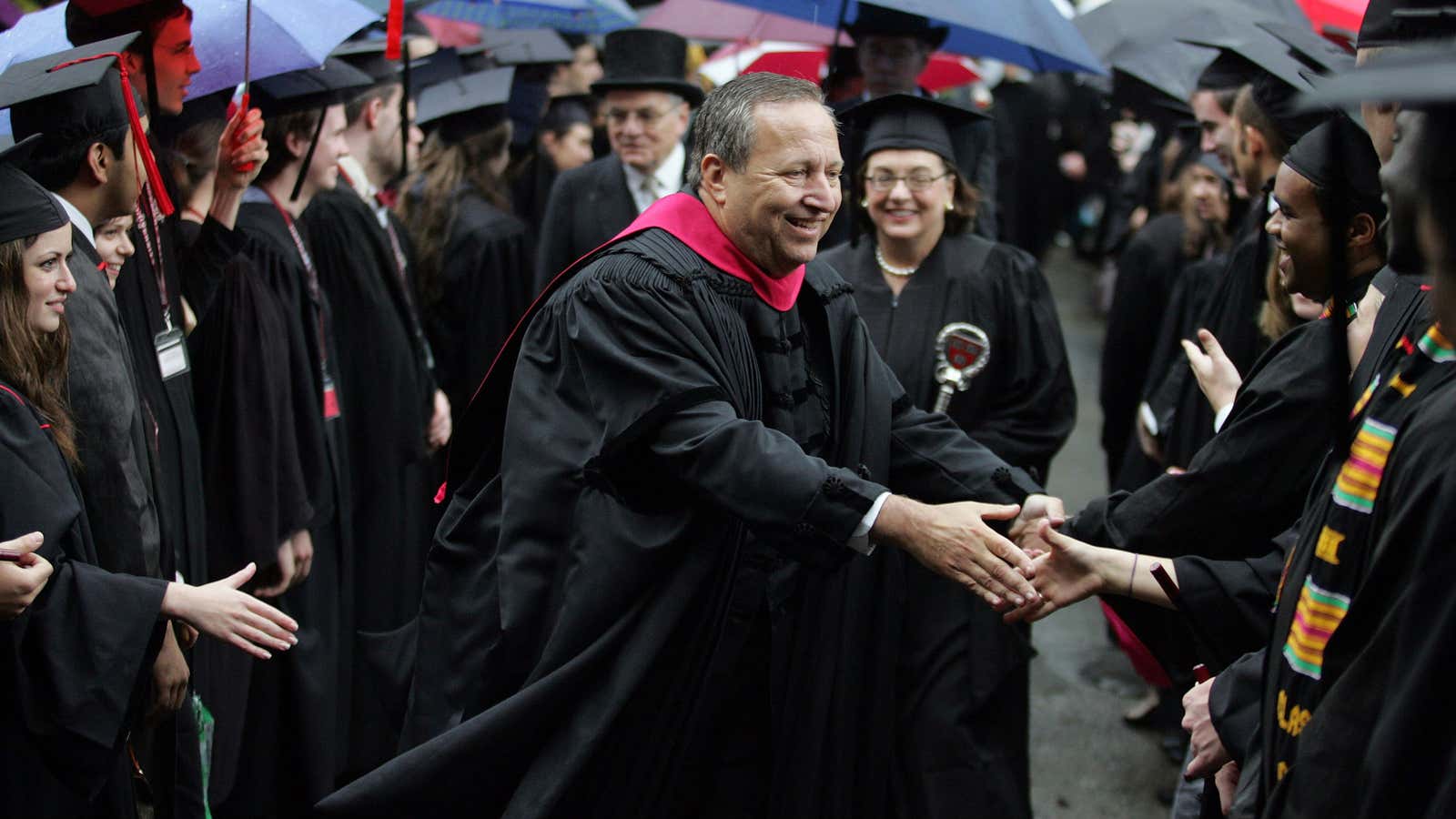After he stepped down as president of Harvard, Larry Summers was a top candidate for US Treasury secretary in 2008, Federal Reserve chairman in 2009, World Bank president in 2012, and Fed chair again in 2013.
He didn’t get any of the jobs.
Summers’s latest just-miss is probably his last go at the public sector. Though he ascended to secretary of the Treasury during the Clinton administration and was Obama’s top economic advisor, his luck seems to have run out.
Now the question is what comes next for the 58-year-old economist who has never had much of a taste for slowing down. “I look forward to continuing to support your efforts to strengthen our national economy,” is all Summers had to say about his future in a letter to Obama announcing his withdrawal from consideration as Fed chair. He didn’t respond to an email seeking comment on his plans.
Summers remains a professor at Harvard—today’s letter was written on Harvard letterhead—and is slated to co-teach three courses next semester, all of them with other professors. The courses are:
BGP-300: Inside Government: Making Public Policy
Lawrence Summers, Cass Sunstein
This seminar will explore an assortment of issues, ranging from environmental regulation (including climate change) to financial regulation to public health, at the intersection of theory and practice. Among other things, the seminar will discuss the role of cost-benefit analysis, legal limits on regulation, and both standard and behavioral economics.
API-126: American Economic Policy
Jeffrey Liebman, Martin Feldstein, Lawrence Summers
Analyzes major issues in American economic policy, including national savings, taxation, health care, Social Security, budget policy, monetary and fiscal policy, and exchange rate management. Current economic issues and policy options are discussed in detail and in the context of current academic thinking.
ITF-225: The Future of Globalization: Issues, Actors, and Decisions
Robert Lawrence, Lawrence Summers
This course examines the economic, political, and social issues raised by globalization — its impact on jobs, inequality, poverty, and the environment — for citizens, societies, and nations. These issues are addressed with a focus on the economic interests and political powers of the actors that constitute the international system and the structures within which those actors operate to produce decisions and outcomes. We provide conceptual and empirical foundations, such as the economics of trade and of international finance, and use these to illustrate the issues and actors. We use analytical frameworks to understand hotly debated issues of the day — such as Greece and the Euro crisis and the rise of China — and also how structures and institutions created today will shape the decisions of the future. We do this through lectures, in-class debates, readings, and simulation exercises that place students in the shoes of the decision makers facing complex choices.
Summers also has an outstanding deal, which he signed in 2007, to write two books for Farrar, Straus & Giroux (FSG), which is part of London-based Macmillan Publishers. The status of that deal is unknown; he reported income for a book advance from FSG in 2008 (pdf). But it would make sense if Summers felt the time was right to air his thoughts in a book or two. When he signed the deal, the books were slated to be about, respectively, higher education and “the new global economy” (which, we should note, is Quartz’s tagline, though Summers had it first).
Whatever else he does, Summers is likely to continue consulting in the private sector. Just yesterday, Citigroup said Summers had suspended his work for the firm “while he is under consideration to be chairman of the Federal Reserve.” So he’ll probably go back to that.
In 2008, between jobs as president of Harvard and director of the National Economic Council, Summers earned millions of dollars working for hedge fund DE Shaw and speaking at financial firms like Goldman Sachs, JP Morgan, and the defunct Lehman Brothers. He often made between $60,000 and $135,000 per speaking engagement.
